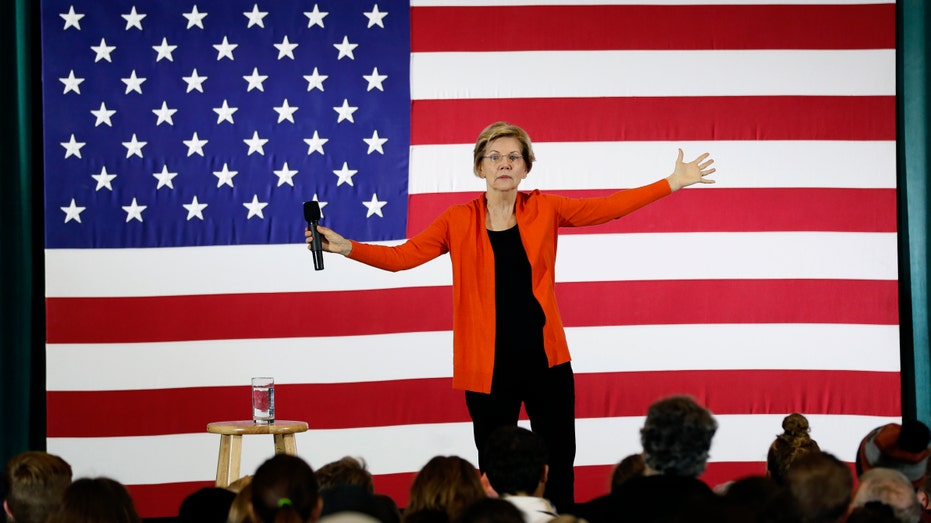Warren's wealth tax would slash billionaires' fortunes over time
Elizabeth Warren bills her tax on billionaires as a mere “six cents on each dollar,” but the proposal — a key tenet of her presidential campaign — has the potential to gut the fortunes of America’s wealthiest families.
If her wealth tax had been in place since 1982, some of the richest people in the world would see their fortunes greatly diminished (though they’d still be immensely wealthy). For instance, Bill Gates — who criticized Warren’s plan last week — would have had about $13.9 billion in 2018, instead of $97 billion, according to estimates by two economists who advised Warren.

Democratic presidential candidate Sen. Elizabeth Warren speaks during a town hall meeting at Grinnell College, Monday, Nov. 4, 2019, in Grinnell, Iowa. (AP Photo/Charlie Neibergall)
Jeff Bezos, the richest person in the world, would have been worth $48.8 billion last year, instead of $160 billion. And Michael Bloomberg, who’s weighing entering the 2020 race as a moderate alternative to Warren, would have had $12.3 billion instead of $51.8 billion. Warren Buffett would be worth $10.4 billion rather than $88.3 billion. Mark Zuckerberg would have $32.5 billion instead of $61 billion.
ELIZABETH WARREN CAPITALIZES ON BILLIONAIRES' ATTACKS, A TACTIC STRAIGHT FROM FDR'S PLAYBOOK
Right now, the 400 wealthiest Americans are worth a record-breaking $2.96 trillion, a 2.2. percent increase from 2018, according to Forbes. On average, each of those individuals would see their net worth drop by $3.1 billion, down from the current $7.2 billion. The calculations did not take into account any measures the billionaires might take to shelter their wealth from taxes, including increased charitable giving.
Under Warren’s plan, which she rolled out in January and revised in October, there would be a 2 percent tax on individuals with a net worth above $50 million, and a 6 percent tax on those worth more than $1 billion. The Massachusetts Democrat’s campaign said the tax -- intended to combat rising income inequality -- would apply to less than 0.1 percent of the population, or roughly 75,000 families.
“Look, somebody has a great idea, and they follow it through and they work hard and they build something, good for them," Warren said on Friday, when asked whether she thought billionaires should exist.
However, the Massachusetts senator followed that with a caveat: Because billionaires rely on taxpayer-funded roads, bridges, police, firefighters and educated workers to build their businesses, she said, they needed to pay steeper taxes.
“Here’s my view,” she said. “You make it to the top, to the tip-top, then the answer is: Pay a wealth tax so we can invest and create opportunities for everyone else. That’s what my two-cent tax is about.”
GET FOX BUSINESS ON THE GO BY CLICKING HERE
There has never been a wealth tax in the U.S. In fact, tax law in the U.S. has become significantly less progressive in recent decades, according to a paper by the economists who advised Warren. All three traditional taxes -- the individual income tax, the corporate income tax and the estate tax -- have weakened. For instance, the top marginal federal income tax rate has fallen dramatically, from more than 70 percent between 1936 and 1980 to 39 percent in 2019.
“As a result, when combining all taxes at all levels of government, the U.S. tax system now resembles a giant flat tax,” the economists wrote in a previous study. “All groups of the population pay rates close to the macroeconomic tax rate of 28 percent, with a mild progressivity up to the top 0.1 percent and a significant drop at the top-end, with effective tax rates of 23 percent for the top 400 Americans.”
CLICK HERE TO READ MORE ON FOX BUSINESS




















